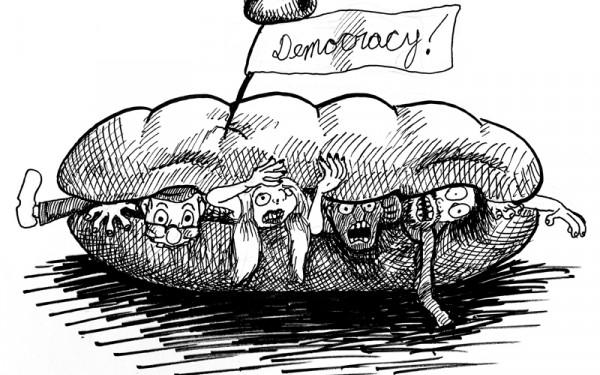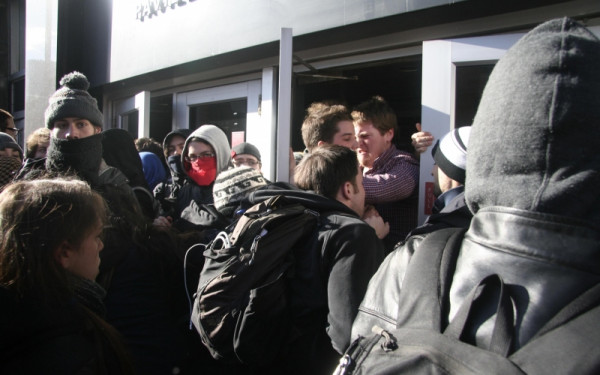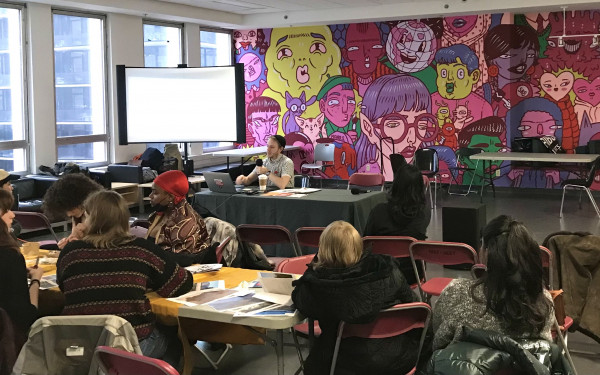Profs and Picketing
First Strike Day Sees Cancelled Classes, Partial Compromise
With six student-run faculty associations (and counting) officially adopting strike mandates on tuition increases following General Assemblies last week, the boycotting of classes at Concordia has officially begun.
And while picketing and other creative embargos are currently underway, some confusion has arisen between professors and students about the status of their classes.
To clear the air, the Concordia University Part-Time Faculty Association sent out a communiqué concerning the student class boycott on March 3, detailing their continued support for students’ mobilization against the tuition hikes and outlining a protocol of professor response to possible picket lines.
“The students are exercising their democratic rights, and we will respect their rights,” said CUPFA Executive of Communications David Douglas in the statement.
“While you cannot support the student action by withdrawing your labour and not teaching your class, you can support them by other means,” he continued. “You have the discretion to shift assignment dates so as to avoid penalizing students who are out.”
Presently under contract, CUPFA members and professors are obligated to report to work as usual. The Concordia administration, meanwhile, has stated that the leniency exercised for the Nov. 10 protest, which saw over 35,000 students from across the province assemble against the hikes, will not apply in the event of a prolonged boycott.
“The Provost has made it clear he will not encourage professors to be flexible and exercise leniency in such circumstances,” Concordia spokesperson Chris Mota told The Link.
In early February, Concordia Provost David Graham said that the university will “continue operating as usual” and that professors should “conduct and manage their courses in accordance with previously communicated course outlines.”
The Women’s Studies Student Association, Fine Arts Student Alliance, Geography Undergraduate Student Society and Students of Philosophy Association had all successfully boycotted some or all of their scheduled classes on Monday by press time.
But not all the GA’s have gone off without a hitch. Members of the Political Science Students Association, which voted on a strike mandate March 1, have complained they were not aware of their GA and are currently questioning its legitimacy.
Despite the individual departmental stances, those on the picket lines Monday agreed that continued communication at this point in the strike is crucial moving forward.
Women’s Studies First to Strike
WSSA students were successful in blocking and boycotting all scheduled classes Monday, and will continue the strike efforts throughout this week.
Their actions came on the heels of some confusion after Simone de Beauvoir Institute Principal Geneviève Rail sent out an email over the weekend to WSSA students stating that, while they were against the hikes and morally support students in their struggle, the professors are not on strike and will be on site.
Earlier in February, the SDBI took official stance against the hikes, calling out the government for the disproportionate effects increasing tuition would have on women, children and minority groups.
“Understand that there are some of us working in our offices who stand with the strikers. This is a striker-supported zone,” Rail told the dozen Women’s Studies and Sexuality students who had formed two picket lines in front of the Institute on Monday afternoon that prevented students and professors from attending regularly scheduled courses. “It’s our future too.”
The WSSA will be meeting with the SDBI on Wednesday after professors from the Institute discuss the ongoing boycott actions.
The meeting will be an opportunity for the Institute to “come to a feminist solution” on conflicting messages, according to WSSA reps, who said they anticipate a conversation on academic freedom.
The Show Must Go On
While FASA students successfully boycotted classes after their GA on March 1, theatre students in particular have been experiencing departmental pressure to participate.
Since class attendance is mandatory, some students risk up to 15 per cent off their final grade, while others will have percentage points docked for each day missed.
Though there has been no official email from the theatre professors so far, the students are feeling support from their faculty, according to the Concordia Association for Students in Theatre Secretary Antonio Bavaro.
“What’s going on, big time, and really affecting us is that there’s been a lack of communication [between us and them],” said Bavaro, adding that CAST plans to have an information session and meeting on March 7 for concerned students in the department.
“In terms of FASA, there has been a motion passed for performing arts students […] for the strike not to be applied to rehearsals, studio time and performances. That is a very important thing for us,” Bavaro continued. He added that certain professors have been open to using classroom space to cultivate creative protest ideas.
SoPhiA also used similar boycott initiatives, bringing strike actions into the classrooms by converting class time to conversations about ongoing student mobilization.
In the mean time, smaller general assemblies have also been formed within FASA.
“We’re in constant communication and we’ve had an amazing turnout at these GAs,” said Andy Filipowich, member of Artists Working to raise Awareness & Knowledge about Education, a group that formed after the FASA GA.
FASA and AWAKE are also encouraging students to continue to engage with their art practices, and to contact their professors individually about their boycott politics to avoid academic penalty.
“A lot of profs have allowed students to hand in assignments after the strike and not dock marks, while others are being more strict,” said Filipowich. “If students are experiencing problems, in any department, we encourage them to talk to the CSU Advocacy Centre to find a solution that works for everyone.”
Both FASA and the WSSA will call GAs on a weekly basis to vote on whether to continue with their strike mandate and to vote on motions from their respective memberships.
For more information and links to the department strike organizations, check The Link’s online departmental updates throughout week.

_900_611_90.jpg)


_600_375_90_s_c1.jpg)

